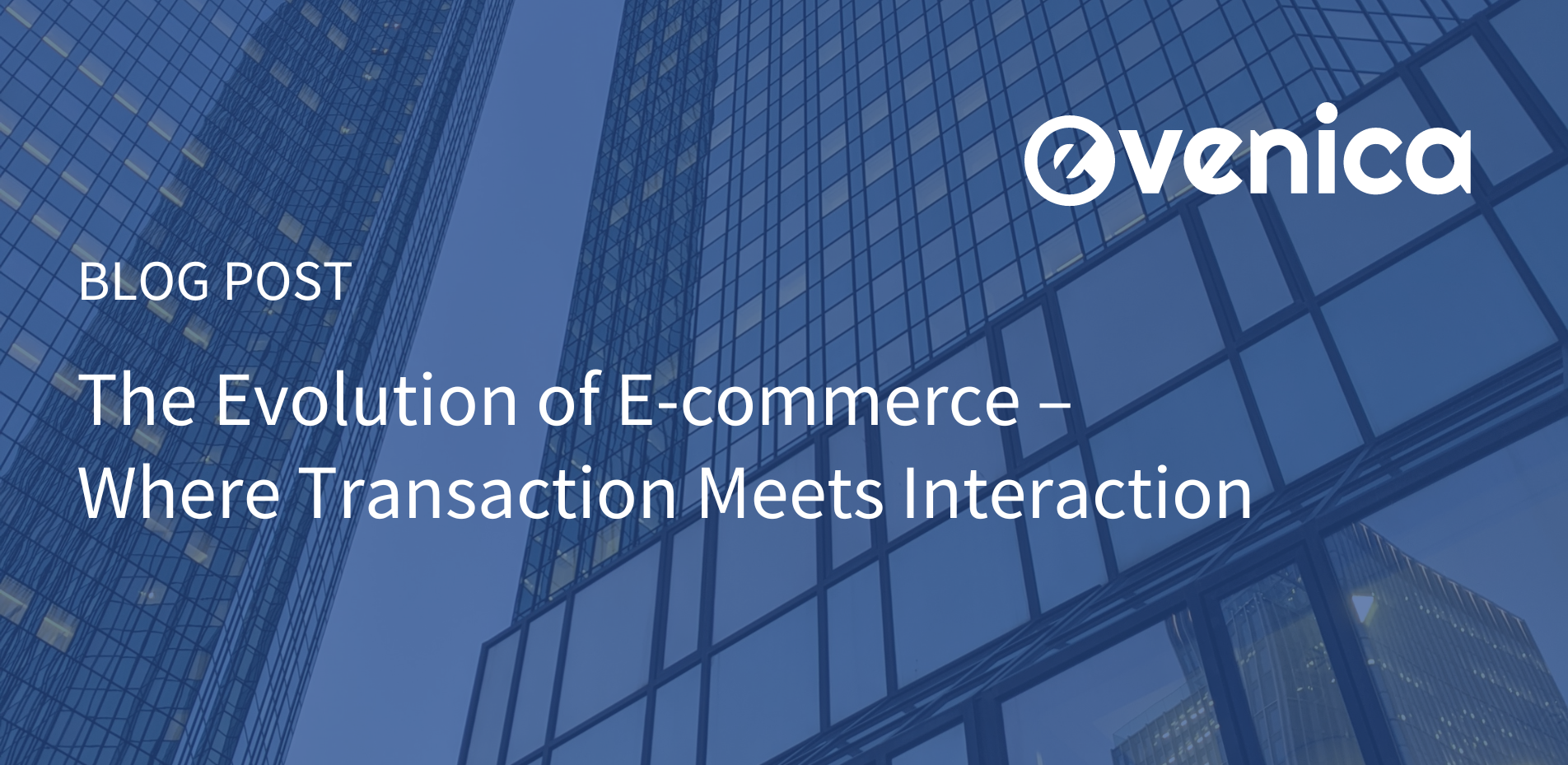
Ten years ago, e-commerce was still a relatively new phenomenon. Amazon was less than one-fifth its current size, shoe retailer Zappos was still making waves with its innovative return policy, and big box retailers like Sears were only beginning to develop an interest in the space. However, as time has progressed, e-commerce has grown from being a curiosity to being a central and necessary feature of the modern economy. This is true for both B2C sellers, among the first to adopt these channels, as well as B2B organizations who had to adopt new ways of doing business after the pandemic’s onset.
At Evenica, we believe that commerce exists where transaction meets interaction, and that this is true for both digital and traditional spaces. Before the internet and e-commerce, most commercial activity took place through one-to-one interactions between salespeople, account managers, and clients. Today, B2B buyers spend a great deal of time browsing websites before even contacting prospective vendors, which makes having interactions that lead to transactions more difficult than ever.
Enabling Commerce Through Technology
Particularly as commercial activity moved online in 2020, B2B buyers have come to expect the same kinds of seamless ordering experiences as the notoriously fickle B2C consumer. This has left many B2B organizations somewhat flat-footed, with many turning to Microsoft Teams as their default solution for both internal and external interactions. However, the potential for ecommerce extends far beyond the virtual meeting, shopping cart, or confirmation email, and particularly with platforms like Microsoft D365 Commerce the opportunities for even traditional sectors like manufacturing are quite exciting.
As the longest-standing and most experienced Microsoft D365 Commerce partner, we have twenty years of experience designing e-commerce platforms for clients in manufacturing, healthcare and other sectors that are not usually thought of in the context of e-commerce. We develop custom e-commerce solutions based on D365 Commerce or our own e4Commerce to support a superior customer experience across every touchpoint while giving you the simplicity of a fully integrated system.
For example, an automotive parts manufacturer in Windsor could use D365 Commerce to not only provide buyers in Detroit with the ability to browse inventory, view purchase history, and set up repeat orders, but augment their field sales reps with tablets, artificial intelligence, and even virtual reality to facilitate better and richer in-person meetings. As these sales representatives visit dealerships throughout Detroit, they can also offer product demonstrations, create custom order forms, and take payments through their tablets, all centrally tracked by Microsoft’s platform. Indeed, by leveraging D365 Commerce, the automaker would be able to increase sales, decrease operational costs, and improve internal data quality.
The Value of Client Portals
Lucia’s phone started ringing, creating an odd ringing noise as it buzzed against the glass of water it was touching. She listened for a moment, appreciating the juxtaposition of tones, and then answered. “Hello?”
“Have you seen these drawings? When we told them any architectural style, they really gave us some options. Oh, also, the invoice is there as well. Due end of month.”
Lucia opened a saved tab on her browser, and started typing in her password. “Give me a second to log in… what kind of styles are you talking about? Tell me there’s an Art Deco option.”
For professional services providers like law firms, accountants, and architects, having an e-commerce-enabled client portal offers both you and your client a single platform to share documents, issue and pay invoices, and manage the administrative aspects of the relationship. It also allows you to track client engagement and gain a 360-degree view of your client’s behaviors within the relationship, emerging needs and upsell opportunities, and signals that extra attention may be required.
In a world where so much of commerce happens online, it makes sense for all professionals to focus more on their interactions than their products and services alone. Building a custom e-commerce solution with D365 Commerce and Evenica’s e4Commerce not only offers you the ability to develop richer and stronger client relationships, it also gives you access to custom Microsoft solutions that may drive additional efficiencies within your firm.
Optimizing Every Touchpoint
As e-commerce technology becomes more sophisticated, and as artificial intelligence continues to automate many time-consuming tasks, professionals of every kind will have more time to focus on developing unique human insights and adding value to their clients. Having a D365 Commerce solution allows B2B sellers to gain a 360-degree view of each relationship without having to pore through all the data themselves, and then use that saved time to improve everything from automated emails to product demonstrations and high-stakes negotiations.
In a future that increasingly relies on automated systems and AI, a truly customer-centered approach will remain the key to success. When coupled with the right e-commerce solution, D365 Commerce and Evenica’s e4Commerce can help ensure that you’re maximizing every interaction and building the strongest possible relationships in the process.
Delivering Exceptional Customer Experiences
Evenica specializes in developing custom e-commerce solutions that deliver sophisticated customer experiences. We have revolutionized customer touchpoints across many sectors, including manufacturing, financial services, and municipalities, and offer not only custom Microsoft solutions on the D365 Commerce architecture, but our own e4Commerce architecture which is D365-compatible. Contact us to learn more about how we can support your next step into e-commerce and technology-enabled sales.
